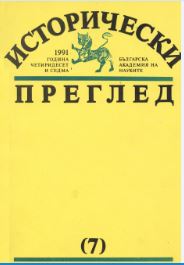Мидхат паша и българското революционно движение през 1872 г. (Втора част)
Midhat Pasha and the Bulgarian Revolutionary Movement in 1872 (Part Two)
Author(s): Krumka SharovaSubject(s): History, Political history, Modern Age, Special Historiographies:, 19th Century, The Ottoman Empire
Published by: Институт за исторически изследвания - Българска академия на науките
Summary/Abstract: Midhat pasha is well known in the Turkish history for his reforming activity. In his policy towards the Bulgarians and the other subordinate peoples to the sultan rule, he follows the pan-Ottoman idea for the suppression of the national-liberation movements. The crude and cruel measures with which he as a Danubian vali deals with the Bulgarian detachment movement in 1867–1868, and with the peaceful population, give possibility of the Bulgarians to convince themselves that his liberal projects for europeanization of the Ottoman empire generally contradict to his position for the subjected peoples and that for them these projects have nothing to do with liberalism and modernization. The coming to power of Midhat pasha again in the summer of 1872, already as a Grand vizier, fully confirms this belief. Immediately after receiving the high position, he starts an energetic campaign against the most outstanding representatives and leaders of the Bulgarian liberation movement at that time – P. R. Slaveikov and L. Karavelov. At the same time he orders the local authorities in Bulgaria to activate the pursuit and repressions against the Bulgarians in the country. The present research examines the concrete manifestations of the anti-Bulgarian policy of Midhat pasha as a Grand vizier in 1872 and his followers in Constantinople, and in the Bulgarian lands. On the basis of the Bulgarian and foreign diplomatic documentation the foreign political and internal political views of Midhat pasha are shown in his struggle for power during his reign. Some facts are carried out about his clever use of the Turkish mood of a small group of Bulgarians in their underhand manner against their rivals at the Porte, against the Russian ambassador N. P. Ignatiev, also for the stopping of newspaper “Macedonia” published by P. R. Slaveikov and for persecution of the Bulgarian revolutionaries in the country and among the emigration in Rumania. With the help of the famous Iv. Penchovich Midhat pasha gets some information for the existence of secret revolutionary committees in Bulgaria before the attack at Arabakonak and revelations are made in connection with it. The rule of Midhat pasha as a Grand vizier coincides in time with the most active period from the work of the Bulgarian Revolutionary Central Committee (BRCC), the first national revolutionary organization with a network of local committees in dozens of Bulgarian villages, which are created by V. Levski. The campaign of the Grand vizier against the liberation movements of the Bulgarians, and especially against the revolutionary movement, creates considerable difficulties for the committee organization of BRCC in Bulgaria and in emigration. The revelation of this organization in October 1872 and the carried out trials are in a direct connection with the contra-measures of Midhat pasha from the previous months. The concrete facts from the development of the Bulgarian revolutionary movement in 1872 and the attitude of Midhat pasha towards their representatives gives him the possibility to establish himself not only as a vali of the Danubian Vilayet in 1867–1868 but also in the time of his first rule as a Grand vizir he follows invariably a policy of suppression of the liberation movements of the Bulgarian and other Balkan peoples for reign of the Ottoman empire and preservation of the Turkish reign over other peoples. The research reveals also the negative role of the Turkophilia feelings as a political current in the Bulgarian liberation movement. The presented work makes an attempt to clarify the problems of the development and struggles for political liberation of the Bulgarian nation in their two main directions: the Bulgarian national movement and the counteraction of the Ottoman state. The examined events are really the first big collision of the two opposite powers – the Bulgarian nation led by BRCC which is for preparation of an uprising for the full political liberation and the Turkish government with the experienced and skillful politician Midhat pasha at the head.
Journal: Исторически преглед
- Issue Year: 1991
- Issue No: 7
- Page Range: 3-19
- Page Count: 17
- Language: Bulgarian
- Content File-PDF

